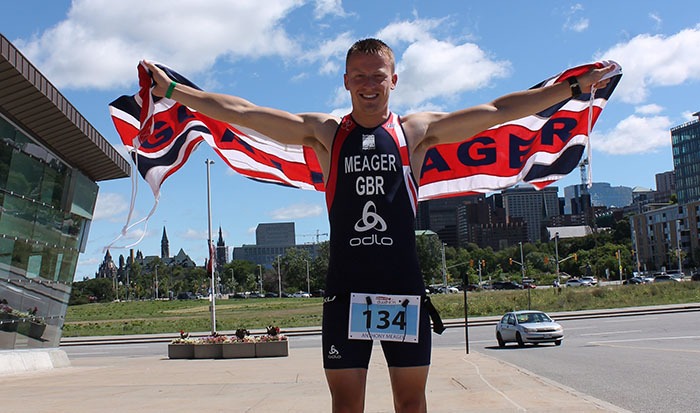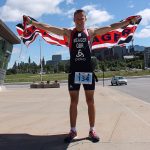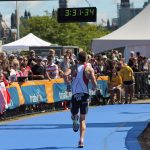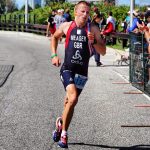Please describe a typical week’s training?
Depending on the time of year, an average training week would consist of 25+ hours, split between swim, bike, run and gym work. Structure is something that works really well for me, so I ensure each month, week or day is planned in great detail. However, no training week is ever the same as the previous week. This is something that keeps motivation high, therefore maintaining training interesting. As the season approaches, training changes slightly, with race fitness becoming the main focus. I love what I do and it wouldn’t be possible without the support from Rocktape and Odlo, two of the best sponsors that I cannot thank enough!
What is your favourite training activity?
I love all three aspects of my sport, but of course I do have a favourite. The bike is my favoured discipline and I look forward to the long rides on my training programme every week. The weather sometimes has a part to play and occasionally the turbo trainer acts as a replacement, but there is nothing better than riding up and down mountains on a training camp in the sun.
What is you least favourite training activity?
Training in England over the winter can be difficult at times, but with good mental strength nothing stops us. Come about April time it is just about warm enough to start some open water swim training. When the water is freezing and I am shivering, I realise this is definitely my least favourite training activity, especially when I get out and cannot feel my feet for hours. If it was in a warm Spanish sea, then my opinion would differ I’m sure. Rest and recovery is a crucial part of any athletes programme, but this is something I do not particularly enjoy and I often sit down to chill out and think, “I’m missing out here, some of the other guys are training!”
What is the single most important or effective part of your training?
The swim is my weakest discipline, so I know every swim session is crucial. Technique is an important factor in the water and I ensure it’s a main focus along with speed and fitness. A triathlon is won on the run, so I also find track sessions extremely effective and rewarding. The pain felt after a focused and successful track session is great and something I strive for every time.
What are your top tips for any aspect of achieving sporting goals?
Setting sporting goals is fundamental for improvement; however achieving these goals is never easy, so I rely on two aspects to make achieving my goals possible. Firstly, commitment – no matter how large the target, it will require some form of commitment. It has to be accepted that there will be sacrifices made along the way, but stay focused and committed and that goal can be reached. Motivation is my other top tip. Even boring sporting goals can always be made interesting. Keep motivation high by varying training activities as boredom and a lack of focus may occur with repetition. Watching videos or reading books associated with your sporting goals is another great way to stay motivated. Finally, a motto I have used for the majority of my sporting life… “Dream. Believe. Achieve.”
What activities do you enjoy that are not directly linked to your main sport?
On easy training days or between sessions I love spending time with family and friends as, during intense blocks of training, it can be difficult to see the important people in my life. I’m also a big fan of coffee. Going for a coffee or playing games consoles are common activities I enjoy in my spare time. I also like to read, but they have to be sports books. Mo Farah and Usain Bolt’s autobiographies are two of my recent favourites.
What’s your guilty pleasure on recovery days?
I try to integrate following Chelsea Football Club on a rare recovery day, however this doesn’t always go to plan so I often find myself watching the games between sessions on TV, or having to rely on highlights. I also used to play some golf, so catching up with friends whilst on the golf course is also something I try to get in on recovery days, weather permitting. I suppose ideally I would be studying when recovering, but it doesn’t always work out that way.



